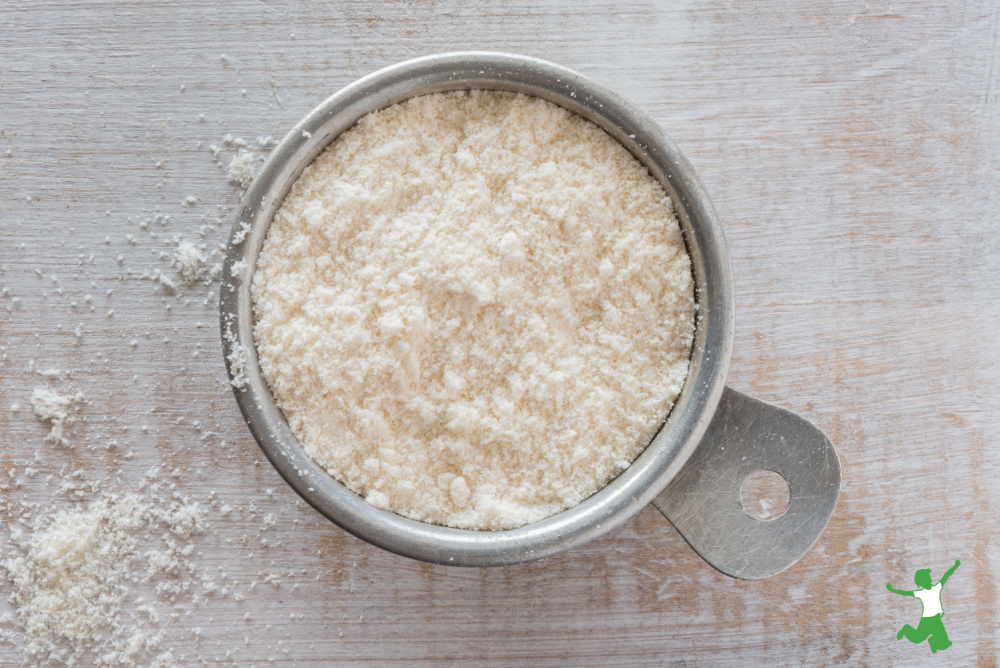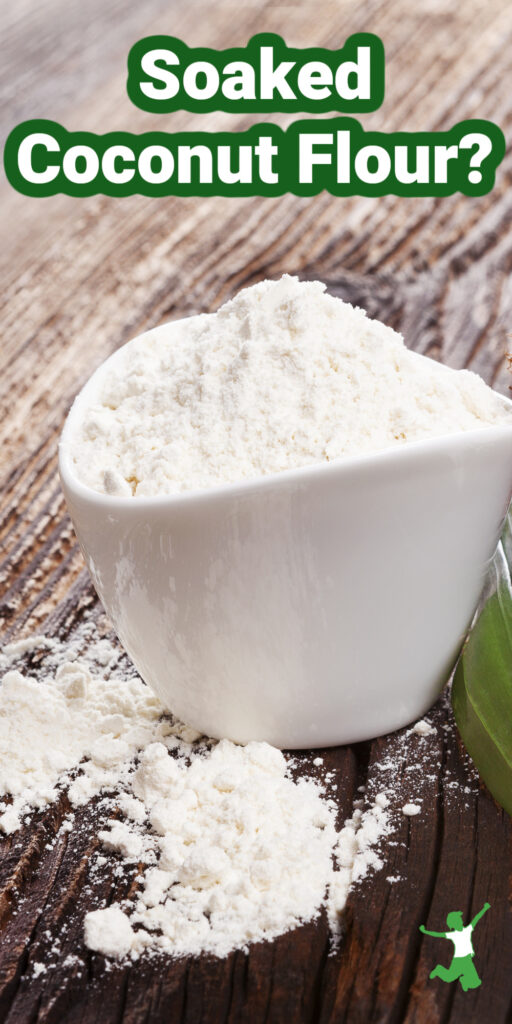Table of Contents[Hide][Show]
Examination of whether soaking coconut flour, one of the most popular baking ingredients for keto or low-carb eaters, is a necessary or beneficial practice to improve digestibility and nutrient absorption.

Baking with coconut flour is a popular low-carb alternative to grain flour.
In fact, it is one of the most popular flours for those espousing a keto dietary protocol.
Coconut flour is disaccharide-free and, as such, an acceptable flour for baking when one is following the GAPS or SCD diets too.
In addition, coconut flour is Paleo/Primal friendly for those who avoid grains as something that was not originally part of the human diet during pre-agricultural times.
An important question for those who include coconut flour on the menu is whether it should be soaked overnight, a hugely beneficial practice for grain flours such as wheat, spelt, einkorn, and rye.
Even gluten-free flours like rice and pseudo-grains like teff and quinoa are recommended for soaking overnight in an acidic medium such as buttermilk or yogurt.
Soaking flour helps to break down antinutrients and greatly improves digestibility and nutrient absorption. Sprouting helps as well.
Coconut: Neither Grain Nor Nut
Coconut flour is derived from the coconut plant, which is not a grain.
Despite its name, it is not a nut either. This can be confusing at first because soaking raw nuts is an important traditional practice as well.
Technically speaking, the coconut is a drupe, a distant cousin of tree nuts.
This means that it is a fruit with an outer fleshy part that surrounds a hard pit or seed in the center. (1)
Besides the coconut, other familiar examples of drupes include mangoes, apricots, olives, and pistachios.
Soaked Coconut Flour and Phytic Acid
In the article Living with Phytic Acid, author Rami Nagel addresses the issue of phytic acid in coconut flour.
Phytic acid is the most well-known antinutrient in grains, nuts, seeds, beans, and other legumes that is reduced by soaking.
In this article, Mr. Nagel states:
We do not have enough information about the preparation of coconut flour to say whether soaking reduces phytic acid, but as with other phytic-acid containing foods, the likelihood is that it is at least partially reduced. (2)
In addition, coconut itself is not a high phytate-containing food. For example, 100 grams of coconut contain approximately 230 mg of phytate.
This compares with 1800 mg/100 g of phytate in cashews, 1300 mg/100 g of phytate in almonds, and 1000 mg/100 g of phytate in dried lima beans.
Secondary products made from almonds such as almond flour and almond meal are also very high in phytates as well as oxalic acid. (3)
Based on the fact that no research is indicative of the benefits of soaked coconut flour and that it is a low phytate-containing drupe, I do not soak my coconut flour prior to baking.
When to Soak Coconut Flour
However, if a person is on the GAPS or SCD diet and eating coconut-containing foods several times a week, it might be wise to use soaked coconut flour since it is a regular feature on the menu.
The goal with regard to phytic acid is not to completely eliminate it from the diet but rather to keep it at manageable and acceptable levels.
Soaking those foods that are naturally high in phytates such as seeds, nuts, legumes, and grains and only soaking other foods that are eaten frequently but are low in phytates by comparison such as coconut flour seems a reasonable approach to meeting this overall dietary goal.
Recipes Using Coconut Flour
If you’ve never baked with coconut flour, here are some of my favorites using this popular keto ingredient.

(1) Coconut Plant
(2) Living with Phytic Acid
(3) Phytic Acid in Food








Hi Tina, in Fiber Menace he is primarily talking about fiber from grains, NOT the gentle fiber from fruits and vegetables which is a totally different kind of fiber and much more gentle on the digestive tract. Coconut is a fruit (drupe) and so would be included in the gentler classification of fiber.
I firmly believe that the high fiber in coconut flour is very hard on the digestive tract even in those folks with no digestive issues. After reading Fiber Menace and doing no grains or high fiber fruits or veggies for several months, I also firmly believe fiber is not necessary and only does harm.
Tina
hi tina…
i’m contemplating reading Fiber Menace….you found this advice to help you then?! it’s worth buying?
Hi Elizabeth, perfection can't ever be the goal, can it? The fiber in coconut flour can be a problem for some especially if they are just coming off the standard American (SAD) diet. But, if you've been eating traditionally for awhile and want to go grain free for a short period of extra healing (6 months) then coconut flour is usually not a problem in my experience in my WAPF Chapter.
Sarah,
Thank you for the egg help. I am a mom of little ones and appreciate the research you do FOR me so that I can spend more time with them. Appreciate you so very much! Keep up the fantastic work!
I think this all comes down to having a little perspective. I love what you said:
"In essence, then, the goal with regard to phytic acid is not to completely eliminate it from the diet but rather to keep it at manageable and acceptable levels."
It's so important not to have the goal of making food that is "perfect." It's not really possible, and can be very stressful (especially for real food newbies!). I prefer the idea of tackling the biggest offenders and then working from there.
I think if people are finding coconut flour to harsh on digestion, it might be its high fiber content. It does have a load of fiber, which can be a good thing… unless you have digestive difficulties and then it can cause irritation. So it's also important to have an idea of how any particular food impacts your individual body.
I've finally started soaking some of my coconut flour recipes. Another part of the equation is that a recipe for, say, coconut flour pancakes calls for way less flour than wheat pancakes. I use about 1/4 cup of coconut flour to feed my family of 4 (with a lot of eggs!) vs 2-3+ cups of wheat flour when we used wheat.
For the eggs, I've frozen them in ice cube trays before, then popped out and put in a freezer ziplock 🙂
Oh, also .. check out my videoblog on how to make Protein Cookies (made from egg whites). See the cooking classes to the right of this post and click on the "Desserts". This recipe uses up a ton of egg whites and these cookies are fantastic and grain free.
Hi Anon, it depends on how fresh the eggs are when you got them from your farmer and whether or not he/she refrigerated them. My local eggs are just a couple days old and have not been refrigerated when I get them , so the egg yolks/whites will last easily a week in the fridge. I have never frozen them, but it should be fine to do this. I know the commercial egg producers partially freeze the eggs during shipping/handling to increase shelf life – commercial eggs are something like 6 weeks old on average by the time they get to store shelves from what I've read in the past.
Hi! I need to ask you a question and I don't know any other way of getting the question to you. So…I will ask it here 🙂 How long can non-store bought egg whites and egg yolks be stored in the fridge? I often have left over egg whites and sometimes left over egg yolks after making different recipes. I pay $5/dozen and I hate to waste them. I am making waffles today that call for a LOT of egg whites and need to know how long I can keep the yolks. And, often I eat a lot of yolks and have leftover egg whites. Can they be frozen? Thanks for your help!
Hi — I made coconut flour pancakes after months of not having coconut flour and cutting back on grains and gluten. I had a very strong reaction to the coconut flour: severe bloating in my upper intestines and very painful cramping….. I think I have leaky gut symptoms and used to eat coconut flour pancakes a lot, but have now decided to just stay away from coconut flour for the time being….and anything else that can excerbate leaky gut…..